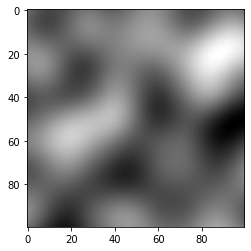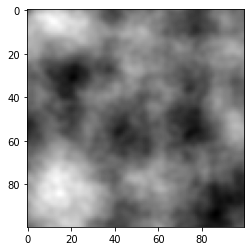
Security News
Research
Data Theft Repackaged: A Case Study in Malicious Wrapper Packages on npm
The Socket Research Team breaks down a malicious wrapper package that uses obfuscation to harvest credentials and exfiltrate sensitive data.
Smooth random noise generator
read more https://en.wikipedia.org/wiki/Perlin_noise
source code: https://github.com/salaxieb/perlin_noise
noise = PerlinNoise(octaves=3.5, seed=777)
octaves : number of sub rectangles in each [0, 1] range
seed : specific seed with which you want to initialize random generator
tile_sizes : tuple of ints of you want to noise seamlessly repeat itself
from perlin_noise import PerlinNoise
noise = PerlinNoise()
# accepts as argument float and/or list[float]
noise(0.5) == noise([0.5])
# --> True
# noise not limited in space dimension and seamless in any space size
noise([0.5, 0.5]) == noise([0.5, 0.5, 0, 0, 0])
# --> True
# noise can seamlessly repeat isself
noise([0.5, 0.5], tile_sizes=[2, 5]) == noise([2.5, 5.5], tile_sizes=[2, 5])
# --> True
Usage examples:
import matplotlib.pyplot as plt
from perlin_noise import PerlinNoise
noise = PerlinNoise(octaves=10, seed=1)
xpix, ypix = 100, 100
pic = [[noise([i/xpix, j/ypix]) for j in range(xpix)] for i in range(ypix)]
plt.imshow(pic, cmap='gray')
plt.show()

import matplotlib.pyplot as plt
from perlin_noise import PerlinNoise
noise1 = PerlinNoise(octaves=3)
noise2 = PerlinNoise(octaves=6)
noise3 = PerlinNoise(octaves=12)
noise4 = PerlinNoise(octaves=24)
xpix, ypix = 100, 100
pic = []
for i in range(xpix):
row = []
for j in range(ypix):
noise_val = noise1([i/xpix, j/ypix])
noise_val += 0.5 * noise2([i/xpix, j/ypix])
noise_val += 0.25 * noise3([i/xpix, j/ypix])
noise_val += 0.125 * noise4([i/xpix, j/ypix])
row.append(noise_val)
pic.append(row)
plt.imshow(pic, cmap='gray')
plt.show()

Library has a possibility to generate repetative random noise with custom tile sizes:
import matplotlib.pyplot as plt
from perlin_noise import PerlinNoise
noise = PerlinNoise(octaves=2, seed=42)
xpix, ypix = 800, 1200
lim_x, lim_y = 6, 9
pic = [
[
noise([lim_x * i / xpix, lim_y * j / ypix], tile_sizes=[2, 3])
for j in range(xpix)
]
for i in range(ypix)
]
plt.imshow(pic, cmap="gray")
plt.show()

import matplotlib.pyplot as plt
from perlin_noise import PerlinNoise
noise1 = PerlinNoise(octaves=1)
noise2 = PerlinNoise(octaves=3)
noise3 = PerlinNoise(octaves=6)
noise4 = PerlinNoise(octaves=12)
xpix, ypix = 800, 1200
lim_x, lim_y = 4, 6
tile_sizes = (2, 3)
pic = []
for i in range(ypix):
row = []
for j in range(xpix):
noise_val = noise1([lim_x * i / xpix, lim_y * j / ypix], tile_sizes)
noise_val += 0.5 * noise2([lim_x * i / xpix, lim_y * j / ypix], tile_sizes)
noise_val += 0.25 * noise3([lim_x * i / xpix, lim_y * j / ypix], tile_sizes)
noise_val += 0.125 * noise4([lim_x * i / xpix, lim_y * j / ypix], tile_sizes)
row.append(noise_val)
pic.append(row)
plt.imshow(pic, cmap="gray")
plt.savefig("pics/multy_noise_tiled.png", transparent=True)
plt.show()

for tiles to work correctly, number of octaves MUST be integer
import matplotlib.pyplot as plt
from perlin_noise import PerlinNoise
noise = PerlinNoise(octaves=2.5, seed=42)
xpix, ypix = 800, 1200
lim_x, lim_y = 6, 9
pic = [
[
noise([lim_x * i / xpix, lim_y * j / ypix], tile_sizes=(2, 3))
for j in range(xpix)
]
for i in range(ypix)
]
plt.imshow(pic, cmap="gray")
plt.savefig('pics/tiled_with_step.png', transparent=True)
plt.show()

FAQs
Python implementation for Perlin Noise with unlimited coordinates space
We found that perlin-noise demonstrated a healthy version release cadence and project activity because the last version was released less than a year ago. It has 1 open source maintainer collaborating on the project.
Did you know?

Socket for GitHub automatically highlights issues in each pull request and monitors the health of all your open source dependencies. Discover the contents of your packages and block harmful activity before you install or update your dependencies.

Security News
Research
The Socket Research Team breaks down a malicious wrapper package that uses obfuscation to harvest credentials and exfiltrate sensitive data.

Research
Security News
Attackers used a malicious npm package typosquatting a popular ESLint plugin to steal sensitive data, execute commands, and exploit developer systems.

Security News
The Ultralytics' PyPI Package was compromised four times in one weekend through GitHub Actions cache poisoning and failure to rotate previously compromised API tokens.